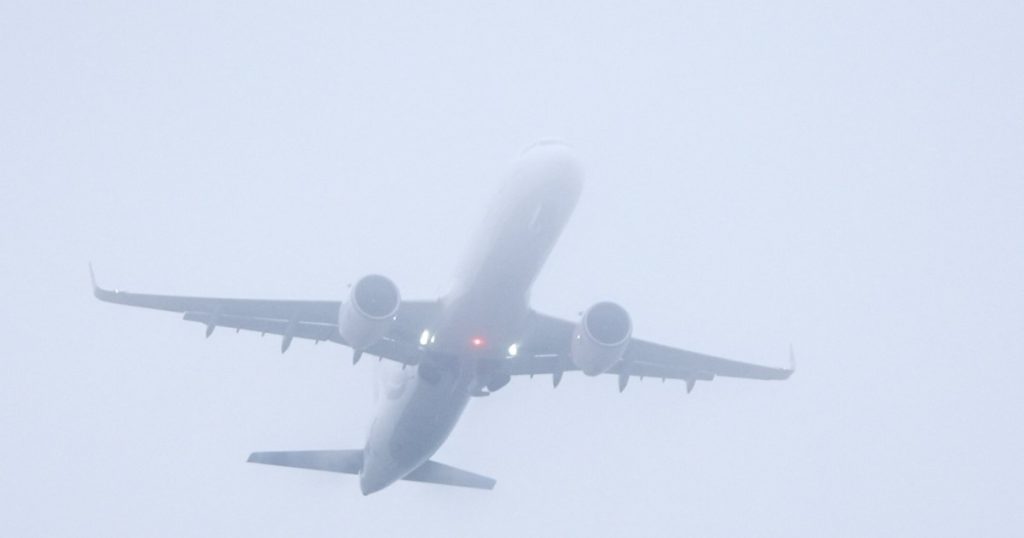Paragraph 1: Flight Disruptions at Gatwick Airport Amidst Dense Fog
London Gatwick Airport, one of the UK’s busiest air travel hubs, experienced significant flight disruptions over the Christmas holiday period due to thick fog, causing delays and cancellations for tens of thousands of passengers. This travel chaos unfolded during one of the peak travel times of the year, adding to the stress and inconvenience for travelers attempting to return home or embark on their holiday journeys. The dense fog severely limited visibility, making it unsafe for aircraft to take off or land. This resulted in numerous flights being grounded, leaving passengers stranded at the airport or their destinations, while others faced extended delays as airlines struggled to manage the backlog of flights.
Paragraph 2: Passenger Experiences and Impact of Disruptions
Kiera Quayle, one of the many passengers affected by the fog-induced disruptions, shared her ordeal with Sky News. Stranded on the Isle of Man after visiting her husband’s family for Christmas, her Easyjet flight was initially delayed and then ultimately cancelled. Facing an extended stay, she and her family were fortunate to have relatives to stay with, but the disruption nonetheless caused significant logistical challenges. Rebooking flights, arranging alternative accommodations, and ensuring the care of their pets added layers of complexity to their already disrupted travel plans. The unexpected expenses, such as extended car parking charges at Gatwick, further compounded the inconvenience. Ms. Quayle’s experience reflects the widespread impact of the fog-related disruptions on countless travelers.
Paragraph 3: Meteorological Conditions and Forecasts
The Met Office, the UK’s national weather service, provided insights into the prevailing meteorological conditions and forecasts. While the thick fog that plagued Gatwick Airport is expected to clear, the forecast suggests a shift towards more unsettled weather. Snow and rain are anticipated as the New Year approaches, raising concerns about potential further travel disruptions. A yellow weather warning has been issued for Scotland, alerting residents to the possibility of heavy downpours and significant disruption. Similarly, northern England faces a yellow weather warning for strong winds, with gusts potentially reaching up to 60 mph. These evolving weather patterns underscore the challenges faced by the aviation industry and travelers alike.
Paragraph 4: Broader Implications of Weather-Related Disruptions
The fog-related disruptions at Gatwick Airport highlight the broader vulnerability of air travel to adverse weather conditions. The aviation industry relies heavily on clear visibility for safe and efficient operations. When visibility is compromised by fog, snow, or other meteorological phenomena, it can lead to cascading effects throughout the air travel system. Delays and cancellations ripple across the network, affecting not only the passengers immediately impacted but also those with connecting flights and subsequent travel plans. The economic impact of such disruptions can be substantial, with airlines incurring costs associated with rebooking, compensating passengers, and managing logistical challenges. Furthermore, the disruption to passengers’ schedules and plans can have personal and professional consequences, adding further costs and inconvenience.
Paragraph 5: Airport Operations and Mitigation Efforts
Airports, like Gatwick, implement various measures to mitigate the impact of adverse weather. Advanced weather forecasting systems provide early warnings of potential disruptions, allowing airlines and airport authorities to prepare accordingly. Ground crews are trained to handle aircraft and passengers in challenging weather conditions, and specialized equipment is employed to enhance visibility and maintain runway safety. However, the limitations of technology and infrastructure mean that severe weather events can still overwhelm these mitigation efforts. In such cases, passenger safety remains the paramount concern, necessitating flight delays and cancellations to ensure that aircraft can operate safely.
Paragraph 6: Passenger Advice and Resources
Passengers are advised to check with their airlines for the latest flight status information before traveling to the airport. Real-time updates are often available on airline websites and apps, providing the most current information on delays and cancellations. Travel insurance can offer financial protection against losses incurred due to weather-related disruptions, covering expenses such as accommodation, meals, and alternative transportation. Passengers should also familiarize themselves with their airline’s policies regarding delays and cancellations, including compensation and rebooking options. Staying informed and prepared can help minimize the stress and inconvenience of travel disruptions caused by adverse weather.











